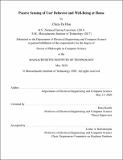Passive sensing of user behavior and Well-being at home
Author(s)
Hsu, Chen-Yu,Ph. D.Massachusetts Institute of Technology.
Download1191624908-MIT.pdf (20.21Mb)
Other Contributors
Massachusetts Institute of Technology. Department of Electrical Engineering and Computer Science.
Advisor
Dina Katabi.
Terms of use
Metadata
Show full item recordAbstract
Learning people's behavior in their homes is central to health sensing, behavioral research, and building smarter environments. In this thesis, we explore learning such information in a passive and contactless manner - without asking people to wear sensors on their bodies or change the way they normally live. We leverage that radio frequency (RF) signals bounce off people, and carry information about them. This thesis presents systems, algorithms, and machine learning models to analyze the signals in the environment and infer information about people's behavior and well-being. Specifically, we analyze the surrounding RF signals to infer people's movement patterns and enable continuous monitoring of gait velocity and stride length. We also sense people's sleep efficiency, sleep onset, and nocturnal awakenings using radio signals, without any wearable devices. Further, we demonstrate that radio signals carry information about people's identity and body shape. This thesis introduces the first system that reconstructs a person's silhouette using RF signals. We then develop this system further to identify users in their homes with no restrictions on their movement patterns. This thesis also shows that the combination of identity and movements allows us to analyze user behavior and interaction at home, without asking users to write diaries or deploy cameras in their living space. Finally, we introduce a new self-supervised learning method to infer appliance usage at home. Collectively, the models and systems in this thesis provide a toolkit for learning behavioral analytics at home from the surrounding radio signals, and addressing questions like who, what, and when, in a passive manner with minimal interference with users' lives.
Description
Thesis: Ph. D., Massachusetts Institute of Technology, Department of Electrical Engineering and Computer Science, May, 2020 Cataloged from the official PDF of thesis. Includes bibliographical references (pages 151-168).
Date issued
2020Department
Massachusetts Institute of Technology. Department of Electrical Engineering and Computer SciencePublisher
Massachusetts Institute of Technology
Keywords
Electrical Engineering and Computer Science.